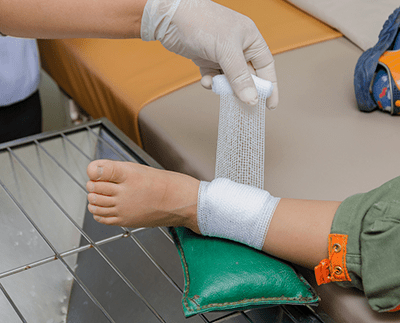Arteries are the blood vessels which carry oxygenated blood from the heart to the tissues and organs of the body. The health and proper functioning of the arteries is therefore essential for the health of the body as a whole.
If the arteries become narrowed or restricted, or if the heart is not functioning at full efficiency, a condition known as ischemia, the flow of blood and essential nutrients may be reduced to the point at which tissue and skin become so deprived of oxygen that they start to die off and form open wounds.
 Obesity, type 2 diabetes, kidney problems, lack of joint mobility and high blood pressure may be contributory factors to the development of this condition.
Obesity, type 2 diabetes, kidney problems, lack of joint mobility and high blood pressure may be contributory factors to the development of this condition.
Poor blood flow also makes these wounds slower to heal, more prone to infection, and so lead to the formation of arterial (ischemic) ulcers. As the legs and feet are furthest away from the heart these areas of the body are particularly prone to these problems.
Although they are usually treatable, arterial ulcers can be extremely painful and distressing. They may also have serious long-term health consequences, including, in the most extreme cases, amputation of the affected limb.
So it’s far more desirable to prevent them happening in the first place.
People in at risk groups should look carefully at their legs and feet on a regular basis. Red, sore or painful areas between the toes, or on the ankles, heels, soles and insteps of the feet, as well as the lower legs, are all areas which may require particular attention.
But even in the absence of any such symptoms there are preventative measures which may help.
Keep moving
Any physical activity that stimulates blood circulation can be beneficial, but if it involves walking or running it’s important to protect the feet. Both socks and shoes need to fit properly and not put undue pressure on the feet and ankles.
Ideally, go for an effective cardiovascular exercise such as swimming which doesn’t stress the joints. Keep the feet warm and don’t use compression socks unless advised by a physician.
Healthy Diet
Obesity, high blood pressure and high cholesterol are health issues which may adversely affect the circulation and so significantly increase the risk of an individual developing arterial ulcers; and while these may be somewhat subject to genetic factors, they are also undoubtedly influenced by lifestyle choices such as diet and smoking.
Adopting a low-fat diet and consuming plenty of fruit and vegetables can help, but for very high risk individuals prescription medications may also be required.
Contact DFW Wound Care Center
In the worst case scenario of chronic ulcers or wounds which refuse to heal, the kind of specialized care offered by the DFW Wound Care Centers in Plano, Irving and Lewisville is essential.
Contact us
Schedule an appointment
with our specialists by contacting us or calling our:
